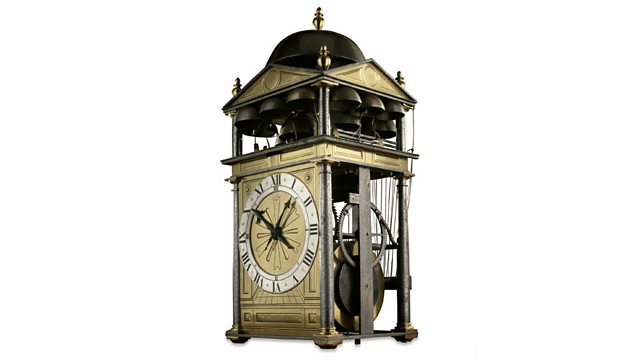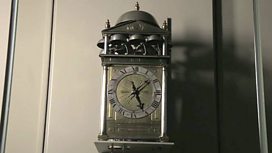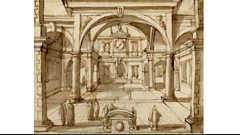16. A Time of Change, a Change of Time
Neil MacGregor reveals how a musical striking clock changed the relationship Shakespeare's audiences had to time. From May 2012.
A rare domestic clock with an equally rare minute hand and quarter-hour chimes reveals the changing relationship Shakespeare's audiences had to time.
Object-based history series presented by Neil MacGregor, former Director of the British Museum.
Taking artefacts from William Shakespeare's time, he explores how Elizabethan and Jacobean playgoers made sense of the unstable and rapidly changing world in which they lived.
With old certainties shifting around them, in a time of political and religious unrest and economic expansion, Neil asks what the plays would have meant to the public when they were first performed.
He uses carefully selected objects to explore the great issues of the day that preoccupied the public and helped shape the works, and he considers what they can reveal about the concerns and beliefs of Shakespearean England.
Producer: Paul Kobrak
First broadcast on 91�ȱ� Radio 4 in May 2012.
Last on
More episodes
Previous
![]()
A Striking Musical Clock
Watch a short video of the clock.
A Striking Musical Clock
Date: 1598
Size: H: 590mm W: 260mm L: 233mm
Made in: London
Made by: Nicholas Vallin
Material: Steel, Brass, Gold
��
Time hasn’t always moved as fast as it does in the 20th century. Of course, this isn’t true, but in today’s fast-paced world of constant communication, commuting and commitments, maybe it just feels like the clock is ticking faster.
��
The way we perceive and organise time is shaped to a large extent by our ability to measure it. Shakespeare’s audience would have been familiar with clocks and telling the time: there are over 80 references to clocks in his plays, making it clear to us that ‘Shakespearean’ time was well on its way to being modern time.
��
Public clocks, and increasingly private clocks like this one made in London in 1598, were used to orchestrate the workings of the city – and when the clock struck 2 o’clock, it was time to head to the theatre.
��
This object is from the
��
��
Quotations
'Tis no less, I tell you, for the bawdy hand of the dial is now upon the prick of noon' Romeo and Juliet, Act 2 Scene 4 'For now hath time made me his numbering clock. My thoughts are minutes, and with sighs they jar' ��
Richard II, Act 5 Scene 5
Background
- In 1400, there were only 25 public clocks in England but by 1500, 'telling the time' was a normal thing to do
- Clock time is often addressed in negative terms: socially oppressive, against the natural order, omnipotent and all-pervasive
- There are over 80 references to clocks in Shakespeare's plays
- This Vallin clock is quite cutting edge in that it strikes the quarter hour and also has a minute hand - far from common in 1600
- Musical clocks were rare in England at this time - though relatively well known in Germany and the Netherlands
More from Radio 4: The mechanical galleon

Neil MacGregor's world history explores the impact of the great age of European discovery between 1450 and 1600. Today he is with a magnificent clockwork galleon.
��
More from Radio 4: Time

Melvyn Bragg examines the history of mankind’s attempt to understand the nature of time. Does it exist independently of our perception of it, or is it merely a figment of our imagination?
��
More from Radio 4: Ticking Over

Can the Isle of Man create a revival in watch making? Peter Day finds out if we can really bring back a British tradition.
��
Broadcasts
- Mon 7 May 2012 13:4591�ȱ� Radio 4
- Mon 7 May 2012 19:4591�ȱ� Radio 4
- Mon 29 Oct 2012 14:1591�ȱ� Radio 4 Extra
- Mon 30 Mar 2015 14:1591�ȱ� Radio 4 Extra
- Tue 31 Mar 2015 02:1591�ȱ� Radio 4 Extra
- Mon 1 Aug 2016 13:4591�ȱ� Radio 4
- Mon 7 May 2018 14:1591�ȱ� Radio 4 Extra
- Tue 8 May 2018 02:1591�ȱ� Radio 4 Extra
- Mon 6 Nov 2023 07:1591�ȱ� Radio 4 Extra
- Mon 6 Nov 2023 12:1591�ȱ� Radio 4 Extra
- Mon 6 Nov 2023 17:1591�ȱ� Radio 4 Extra
- Tue 7 Nov 2023 02:1591�ȱ� Radio 4 Extra
Podcast
-
![]()
Shakespeare's Restless World
Neil MacGregor uncovers the stories 20 objects tell us about Shakespeare's world.




